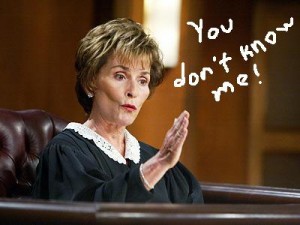Judges and Lawyers are Not Facebook Friends
Yes, Facebook is everywhere. My 70-year old grandpa is even on the social networking site, updating his status almost daily! Although his posts range from the dinner he ate the night before to his latest hobby, it is still an entertaining way to keep in touch with my grandpa.
Recently, a Florida Judicial Ethics Advisory Committee opines on ethical issues relating to judges’ use of social networking sites like Facebook. The verdict…judges may not be “friends” (cyber speaking that is) with lawyers.
 The rationale makes sense in that the presence of social networking provides another avenue for conflict of interest concerns. If the judge is friends with lawyers it may give the impression that they may be in a special place of influence with the judge. Lawyers, however, are allowed to be “fans” of a judge’s Facebook page.
The rationale makes sense in that the presence of social networking provides another avenue for conflict of interest concerns. If the judge is friends with lawyers it may give the impression that they may be in a special place of influence with the judge. Lawyers, however, are allowed to be “fans” of a judge’s Facebook page.
Concern for judicial conflicts of interests has also been addressed by the Supreme Court. The case involved money (in the form of campaign donations), power and judicial politics in West Virginia. Because the controversy of judge’s accepting campaign donations from the lawyers, corporations, and other interests that will potentially become plaintiffs and defendants in their future courtrooms has prompted the U.S. Supreme Court to decide whether big spending on a judge’s election can create an unconstitutional “appearance of bias” that violates the guarantee of due process of law in the Constitution. The court’s 5 to 4 decision on judicial recusal “added the risk of bias to two other standards the court has set for when judges should recuse themselves from a case: when they have a financial interest in the case or when their previous involvement in a case makes it difficult for them to be impartial arbiters.”
Conflict of interest is an aspect of law that is taken very seriously, and rightfully so. The basic crux of the argument is that if a judge is no longer about to be impartial and unbiased in their decision making, then they must recuse themselves from the case. If there is a situation in which a judge declines recusal even though aware that proper grounds exist, then there can be significant repercussions including a mistrial, disbarment, and sanctions.
Although I doubt that the presence of a Facebook friendship with a lawyer would rise to the level of influence the Supreme Court was concerned about, better safe than sorry. I wonder what they’ll do to address judicial tweeting?

Comments
who do you contact about a judge not recusing himself?
Good Question. As with most matters dealing with law and life you are going to want to go about the process diplomaticaly–bringing the conflict of interest to the attention of the judge and request recusal. While the decision on whether recusal is proper still lies with the judge, judges will generally agree to recuse themselves if asked. However, if the judge decides against recusal, that decision can generally be appealed to the next court.
Both federal and state laws hold that judges must recuse themselves if there are grounds to do so. Depending on the circumstances, judges are subject to punishment for not recusing themselves.
If the judge’s decision not to recuse himself or herself was accidental, then there is not likely to be any penalty. For example, if a judge is not aware that proper grounds exist for recusal, then the error will probably be considered harmless.
However, if a judge declines recusal even though aware that proper grounds exist, then there can be significant repercussions. First, the result of the case can be reviewed by an appellate court, and an entire new trial can be ordered.
In addition, a judge who refuses recusal is subject to sanctions. These sanctions vary by jurisdiction, and can include suspension or even disbarment.